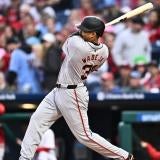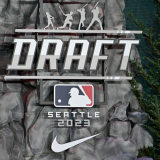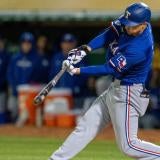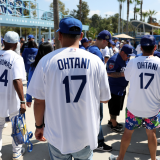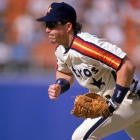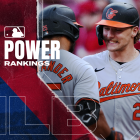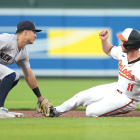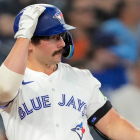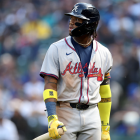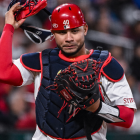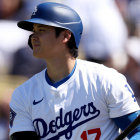Leading up to the announcement of the 2017 Baseball Hall of Fame class on Jan. 18, we're examining each of the 34 candidates on this year's BBWAA ballot. By way of reminder, a candidate must be named on at least 75 percent of submitted BBWAA ballots in order to be elected into the Hall of Fame.
We've already looked at the numerous candidates who are certain to fall off the ballot after only one year (candidates receiving less than five percent drop off the ballot). Now we're looking at those hopefuls who figure to have meaningful Hall of Fame support and perhaps even earn induction at some point. Up next is decorated Astros slugger Jeff Bagwell.
Bagwell, a Connecticut native, was drafted by the Red Sox in 1989, but they famously traded him as a minor-league to the Astros in exchange for Larry Andersen. Suffice it to say, it was one of the worst trades in Sox franchise history. On the flipside, the Astros, in exchange for a 37-year-old reliever, got back a franchise-altering talent. Bagwell would wind up as perhaps the greatest player in Astros history. Now let's have a closer look at his Hall of Fame case ...
The case for Bagwell
It's an easy one to make. Across parts of 15 big-league seasons in Houston, Bagwell batted .297/.408/.540 with 449 home runs; 488 doubles; 2,314 hits; 1,529 RBI; 1,517 runs; 1,401 walks, and 202 stolen bases. Bagwell wound up ranked in the top 100 all-time in OPS+ (36th), runs scored (64th), RBI (49th), total bases (72nd), doubles (72nd), home runs (38th), walks (28th), extra-base hits (46th), times on base (58th), sac flies (26th), defensive games as a first baseman (11th), double plays turned as a first baseman (12th), and assist as a first baseman (third). Impressive dossier, that. Particularly impressive are his power outputs and his top-40 OPS+. Yes, Bagwell generally played during a hitter-friendly era, but OPS+ adjusts for league and ballpark conditions (and don't forget that Bagwell spent a lot of time in the run-suppressing Astrodome). Even in the context of his era, he stands out as one of the most productive hitters ever on a rate basis.
To put it all in Hall of Fame terms, we'll turn to Jay Jaffe's JAWS system available at Baseball-Reference. Using WAR, JAWS compares a player, in terms of both peak value and overall career value, to those Hall of Famers who played the same position. According to JAWS, Bagwell, among primary first basemen, ranks sixth all-time in career value, fifth in peak value, and sixth in composite value -- i.e., a blend of career and peak value. In each instance, he's far above the average mark for first basemen already in the Hall of Fame. The only first baseman ahead of him on these lists who's not already in the Hall is Albert Pujols, and suffice it to say Pujols will one day sail in on the first ballot. Below Bagwell in career value, for instance, are 12 players who were inducted primarily for their work as first basemen. In other words, Bagwell would elevate the existing standards for Hall of Fame first basemen, and he deserves induction without question.
The case against Bagwell
This is a challenge. Injuries, particular to his shoulders late in his career, kept him from reaching familiar benchmarks like 3,000 hits or 500 home runs, but the overall package of value really overwhelms those concerns. It requires a terribly antiquated view of hitter productivity to say Bagwell isn't worthy. And if you are one to lean to traditional measures, then note Bagwell's lofty RBI and runs scored totals above.
Beyond that, Bagwell has been at least tacitly associated with the PED era in which he played. This is the case despite the fact that Bagwell never failed a test and wasn't named in the Mitchell Report. Because he was strong, muscular, and good at his craft -- like, you know, most professional athletes -- the assumptions flowed. Needless to say, that's a simplistic way to approach a complicated issue. Otherwise, Bagwell's an obvious Hall of Famer who should've gone in on the first ballot.
Will he make it?
Here are Bagwell's ballot percentages have tracked in his six years of BBWAA eligibility (75 percent needed for election) ...
- 2011: 41.7 percent
- 2012: 56.0 percent
- 2013: 59.6 percent
- 2014: 54.3 percent
- 2015: 55.7 percent
- 2016: 71.6 percent
As you can see, that's a very promising trend, and he came very close to making it last year. That brings us to this year's returns. As of this writing Bagwell has appeared on 91.0 percent of the publicly known Hall of Fame ballots, according to Ryan Thibodaux's tracker. While many ballots haven't been tracked, that's a very promising early return. Stated another way, Bagwell needs to muster just 61.5 percent support on the unknown ballots in order to make it. As such, he's probably going to be member of the Hall of Fame's class of 2017. That's very much as it should be.
Other Hall of Fame cases: Posada | Ramirez | Guerrero | Rodriguez | Sosa | Wagner | Walker | Kent | McGriff | Smith | Mussina | Martinez | Bonds | Clemens | Schilling | Raines | Hoffman | Sheffield









